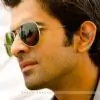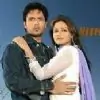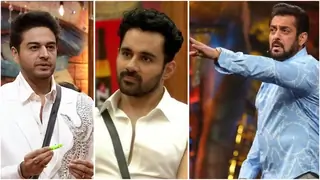When Khushi approaches Arnav hesitatingly for her salary Arnav looks up at her and immediately recollects the previous night's close encounter with her. Reading his gaze she looks away in embarrassment prompting a similar reaction from him. By the time he could compose himself, his sister interrupts and inquires about her father. Hearing that he is better and has been discharged from the hospital, both the brother and sister heave a sign of relief. What followed though caught both of them completely off-guard. Khushi's request to give her salary in the open dhabba she stretched out to him and his subsequent handing over the cheque to her underlined the vast difference in their economic and social status. Although her outstretched hand with the open dhabba may have looked like she was begging for money, in truth she was only asking for the remuneration for her labour.
True to her nature, Khushi openly admitted that she was expecting to be paid in cash but hastened to add that she will deposit the cheque in the bank. When she sees the amount in the cheque though she is shocked to realise that she was being paid Rs.3000 less than the contracted amount. She doesn't hesitate in asking for an explanation for the reduction in her salary and also politely reminds them of her need for money at this hour. Arnav in his typical business style tells her that his accountant has deducted tax at source. Seeing her bewildered expression Anjali explains this to her and assures her that they will do something about it. Khushi being Khushi wants further clarification. She admits that she was under the impression that she was getting a net income of Rs.30,000 when she agreed for this job and wonders aloud whether they cannot pay the tax to the Government at a later date.
Seeing Arnav leave the place Khushi thinks he has again got angry at her uncomfortable questions. Anjali hastens to reassure her that they will do something about her problem and Khushi reluctantly leaves the place, still wondering how she was going to cover the deficit. Arnav returns back from his room holding another cheque for the missing amount but misses her just by a whisker. On enquiry he is told by his sister that Khushi was worried about paying the hospital bills, leaving Arnav with a guilty cum thoughtful expression on his face. What is going through his mind? Does he regret not having taken care of the bills when he visited the hospital the previous night?
The above mentioned scene was very uncomfortable not only for Khushi, Arnav and Anjali but also viewers like us. Money is a delicate matter and more so in the context it was raised. Let us look beyond the actual scene and see the nuances sought to be portrayed in it.
Why is money demanded? Any standard textbook on economics would identify three reasons for demanding money
(1) transactions demand:
The transactions demand for money results from the need for liquidity for day-to-day transactions in the near future. This need arises when income is received only occasionally (say once per month) in discrete amounts but expenditures occur continuously.
(2) precautionary demand:
Precautionary demand for money is for meeting emergencies
(3) speculative demand:
Speculative demand for money refers to the opportunity cost of holding money. Holding money in cash means that it earns no returns. Hence the opportunity cost of money is the return it can earn if held in the form of bank deposits, mutual funds, stocks, bonds etc.
Now coming back to Khushi and Arnav, lets see how this applies to them. As Khushi comes from a lower middle class household, her transaction and precautionary demand for money is the highest. Money is needed for running her household and pay up for unforeseen expenses like her father's medical bills. Being a salaried employee every paise counts for her. A reduction of Rs.3000 in her salary is a big deal for her. As her transactions are in the form of cash she was expecting to be paid in cash.
Arnav is a self made businessman. Money would have been a dire necessity for him at one point but he is well past that stage where his very existence would depend on it. To him the speculative demand for money plays a bigger role than the other two. Being a shrewd businessman he would want to maximise the return on every penny he earns. This explains why he held no cash (or at least not the sum Khushi wanted) in his house for idle cash earns no return. To meet his transactions and precautionary needs he could use his credit cards.
Coming to the issue of tax, Arnav is an honest businessman who pays his taxes promptly to the Government. As per rules, he also ensured that the salaries to his employees were paid out after tax deduction. He did not feel the pinch of tax (although he must be in the highest tax bracket) because his wealth/income was huge enough to meet his requirements. For Khushi though, even a 10 per cent cut in her salary for tax purposes is a huge deal, particularly at the current juncture when expenses were high. While she was willing to pay her taxes, she only wished she could defer it to a later date.
Now coming the more important issue of why did Arnav not pay up the hospital bills. He knew of Khushi's economic situation. He knew that a hospital admission would only increase the expenses. Then why did he not voluntarily take on that burden? Did he forget to do so after his encounter with Khushi at the hospital corridor? Did he subconsciously refrain from doing so in order to retain that gap between the employer and an employee? Did he think that going beyond what a normal employer would do would convey the impression that she matters to him? Anjali's reaction to the situation also baffled me. She must be having her own resources, wouldn't she? Her husband was also earning. Why did she not offer to pay the difference? After all Khushi was employed by her (or at least at her behest).
Lets see if we get answers to these questions.



































